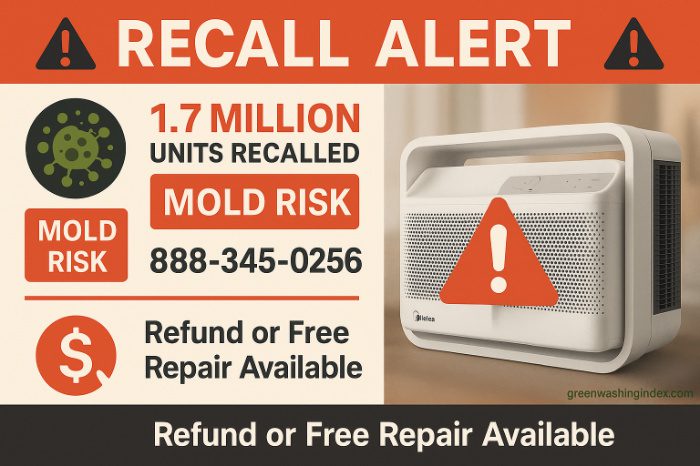

If you own a Midea window air conditioner, your unit may be among 1.7 million recalled due to dangerous mold growth that’s already caused respiratory infections and allergic reactions in at least 17 consumers.
The U.S. Consumer Product Safety Commission (CPSC) announced on June 5, 2025, that Midea U and U+ window air conditioners have a critical design flaw. Pooled water inside these units fails to drain properly, creating perfect conditions for mold growth that can spread throughout your home and pose serious health risks, especially for children, elderly individuals, and those with asthma or weakened immune systems.
This recall affects units sold under 10 different brand names—including Frigidaire, Danby, and Insignia—purchased between March 2020 and May 2025 at major retailers like Amazon, Costco, and Home Depot. Immediate action is required to protect your family’s health and secure your refund or free repair.
This comprehensive guide provides everything you need: how to identify if your unit is affected, step-by-step inspection instructions, detailed remedy options, safety protocols, and answers to critical questions about timelines, legal rights, and alternative cooling solutions. Access the official recall website for immediate assistance.
Determining whether your air conditioner is part of this massive recall is crucial for your family’s safety. With 152 confirmed cases of mold growth reported to the CPSC, quick identification and action can prevent serious health complications.
The recall encompasses Midea-manufactured units sold under 10 different brand names. To check your unit, locate the model number on a label on the front right side of your air conditioner when facing it directly. The label is typically white with black text and includes both the model and serial numbers.
Complete List of Recalled Models:
| Brand | Model Numbers |
| Midea | MAW08AV1QWT, MAW08AV1QWT-C, MAW08U1QWT, MAW08V1QWT, MAW08V1QWT-S, MAW08V1QWT-T, MAW08W1QWT, MAW10U1QWT, MAW10V1QWT, MAW10W1QWT, MAW12AV1QWT, MAW12AV1QWT-C, MAW12U1QWT, MAW12V1QWT, MAW12V1QWT-M, MAW12V1QWT-S, MAW12W1QWT |
| Frigidaire | GHWQ085WD1, GHWQ105WD1, GHWQ125WD1 |
| Danby | DAC080B6IWDB-6, DAC080B7IWDB-6, DAC100B6IWDB-6 |
| Insignia | NS-AC8WU3, NS-AC8WU3-C |
| Keystone | KSTAW08UA, KSTAW10UA, KSTAW12UA |
| Comfort Aire | RXTS-101A, RXTS-121A, RXTS-81A |
| LBG Products | QB-8K CO |
| Mr. Cool | MWUC08T115, MWUC10T115, MWUC12T115 |
| Perfect Aire | 1PACU10000, 1PACU12000, 1PACU8000 |
| Sea Breeze | MWAUQB-12CRFN8-BCN10, WAU310YREX, WAU312YREX, WAU38YREX |
An easy way to verify if your model is recalled is to search for it on Amazon – recalled products are not currently available for purchase.
All affected units share common characteristics: they’re white, measure approximately 22 inches wide by 14 inches high, include remote controls, and feature smart app connectivity through the Midea Air app. The unique U-shaped design that allows windows to close around the unit is a key identifier.
This recall represents one of the largest air conditioner safety actions in recent years, affecting approximately 1.7 million units sold in the United States plus an additional 45,900 units in Canada.
Key Recall Statistics:
Where These Units Were Sold:
Physical Retailers:
Online Platforms:
Contact Midea’s recall hotline at 888-345-0256 (Monday-Friday, 8 AM – 5 PM EST) or visit the official recall website to verify your unit.
The mold hazard in these Midea air conditioners isn’t just a minor inconvenience—it’s a serious health threat that has already affected numerous consumers according to CPSC reports. Understanding how and why this problem occurs can help you assess your risk and take appropriate action.
The root cause of the mold problem lies in the innovative U-shaped design that made these air conditioners popular. While this design allows users to close their windows around the unit for better insulation and noise reduction, it created an unintended consequence: inadequate water drainage.
Air conditioners naturally produce condensation as they cool warm air. In properly functioning units, this water drains outside through designated channels. However, the Midea U and U+ models have a critical flaw in their drainage system. Water accumulates in the unit’s internal reservoir faster than it can drain, creating standing water that becomes a breeding ground for mold and bacteria.
The problem is exacerbated by several factors:
The CPSC has documented 17 cases where consumers experienced health symptoms directly linked to mold exposure from these units. Exposure to mold poses health risks, including respiratory issues and infections, particularly for individuals with asthma, allergies, or compromised immune systems.
Documented Health Effects Include:
High-Risk Groups Requiring Immediate Action:
The CDC warns that the insidious nature of air conditioner mold means exposure occurs continuously while units operate. Unlike visible mold on walls that people avoid, AC mold spreads invisibly through the air, making it particularly dangerous for overnight exposure in bedrooms.
Midea has created an inspection guide to help you determine whether your specific model has mold issues. Before continuing to use your air conditioner, a thorough inspection is crucial. However, disturbing mold can release massive amounts of spores, so proper precautions are essential.
Safety Equipment Needed:
Step-by-Step Inspection Process:
Warning Signs Requiring Immediate Unit Shutdown:
If you discover any of these warning signs, stop using the unit immediately and file for a remedy through the recall program.
Midea offers two remedy options for recalled units: a refund or a free repair. Understanding the details of each option, including timelines and requirements, helps you make the best choice for your situation. Visit the official recall website to begin your claim.
The refund option provides monetary compensation but requires permanently disabling your unit. Refund amounts vary based on when you purchased the air conditioner or its manufacture date if proof of purchase is unavailable, as detailed on the CPSC recall page.
Refund Amount Structure:
Refund Process Requirements:
Method 1 – Ship Back:
Method 2 – Proof of Disposal:
The repair option allows you to keep your air conditioner after addressing the drainage issue. This appeals to consumers who like their unit’s performance aside from the mold risk.
Repair Kit Contents:
Professional Repair Service: For units requiring more extensive work or for consumers uncomfortable with DIY repairs:
Making the right choice depends on multiple factors unique to your situation. Consumer Reports recommends considering age, condition, and replacement availability.
Choose REFUND if:
Choose REPAIR if:
Filing your recall claim correctly the first time prevents delays and ensures you receive your remedy quickly. Follow this detailed process to avoid common mistakes that can slow down your claim.
Your model number is the key to confirming recall eligibility. Check the complete recalled model list to verify your unit.
Where to Find Your Model Number:
Online Process (Recommended):
Phone Process:
During the claim process, you’ll need to definitively choose between refund and repair. This decision cannot be changed once processing begins, so ensure you’ve considered all factors discussed in our remedy comparison section.
For Refund Claims:
For Repair Claims:
After submission, you’ll receive a claim number starting with “MID-” followed by 8 digits. Save this number to track your claim progress on the recall website.
Expected Timeline Milestones:
Your family’s health takes priority over comfort. With 152 confirmed mold cases and 17 reported illnesses, taking immediate protective action while awaiting your recall remedy is essential.
The decision to continue using your air conditioner depends on multiple risk factors. While Midea provides inspection guidelines for continued use, health experts recommend extra caution.
Stop Using Immediately If:
Conditional Use Guidelines (If No Mold Detected):
Mold exposure from air conditioners is particularly dangerous because it’s continuous and concentrated. The CDC provides guidance on minimizing health risks while you await your remedy.
Immediate Protection Steps:
Severe Symptoms Requiring Emergency Care:
For more information on mold-related health effects, consult the National Institute of Environmental Health Sciences.
Learning from others’ errors can save you time, money, and frustration during the recall process. These common mistakes have caused delays or claim denials for other consumers, as reported on recall discussion forums.
Many eager consumers immediately throw away their moldy air conditioners, assuming this demonstrates good faith. However, premature disposal can invalidate your claim.
Why This Matters:
Correct Approach:
Some handy consumers try drilling drainage holes or modifying their units. This well-intentioned action voids both the recall remedy and any remaining warranty.
Prohibited Actions:
The recall process has specific timeframes that, if missed, can result in claim denial or significant delays.
Critical Deadlines:
Households with multiple air conditioners often check only the problematic unit, missing additional affected models. Check all units against the complete recall list.
With summer temperatures rising and recall remedies taking 3-5 weeks, finding safe alternative cooling is crucial. NBC Select and Consumer Reports recommend these tested options.
If you’re receiving a refund or need immediate replacement, these highly-rated alternatives offer similar features without the drainage issues plaguing Midea’s U-shaped design.
1. GE Profile ClearView Window AC
While awaiting your recall remedy or new unit delivery, these temporary solutions provide safe cooling without installation requirements.
Portable Air Conditioners
High-Velocity Fans
Understanding your legal rights empowers you to make informed decisions about participating in the recall and potentially seeking additional compensation for damages beyond what Midea offers.
When manufacturers sell defective products that cause harm, they may be held legally responsible under product liability law. The Midea recall involves several potential legal theories, as discussed by legal experts.
Your Basic Consumer Rights:
Types of Damages You May Have:
As of July 2025, the legal landscape surrounding the Midea recall is rapidly evolving. A class action lawsuit was filed in federal court alleging that Midea’s recall process is intentionally burdensome to discourage participation.
Filed Class Action Details:
How to Participate:
Get quick answers to the most common questions about the Midea air conditioner recall, from timeline concerns to warranty implications.
Refund processing times vary based on your chosen method and documentation completeness. Typical timeline: 2-4 weeks from claim approval according to the official recall website.
Detailed Timeline Breakdown:
While Midea offers a DIY repair kit option, attempting repairs before receiving the official kit voids your recall remedy and warranty. Wait for the official kit which includes proper instructions.
Don’t panic – Midea accepts multiple forms of purchase verification through their recall portal.
Alternative Proof Accepted:
The official repair addresses the drainage issue, but long-term safety depends on proper installation and maintenance as outlined in Midea’s inspection guide.
While mild symptoms may resolve after stopping exposure, certain symptoms require emergency medical care according to CDC guidelines.
Seek Emergency Care For:
The recall remedy doesn’t include electricity reimbursement, but you may have other avenues for recovering these costs through legal action.
Participating in the recall preserves your warranty, while failing to address the safety issue could void coverage according to Midea’s terms.
Used units are still covered under the recall. Safety recalls follow the product, not owner. File your claim through the recall website using the “no receipt” option.
The Midea air conditioner recall represents one of the most significant appliance safety actions in recent years, affecting 1.7 million units that pose serious mold exposure risks. With 152 confirmed mold cases and 17 documented illnesses, this isn’t just a minor inconvenience—it’s a critical health hazard requiring immediate action.
Whether you choose the refund option to eliminate risk entirely or the repair solution to keep your unit, the most important step is acting now. Every day of delay potentially exposes your family to harmful mold spores that can cause respiratory infections, trigger asthma attacks, and create long-term health complications, especially for children, elderly individuals, and those with compromised immune systems.
The recall process, while sometimes complex, provides clear pathways to resolution through the official recall website. You have rights both within the recall program and beyond it, including potential compensation for health impacts and property damage through developing legal actions.
Take action today: Check your model number against the recall list, stop using affected units immediately if mold is present, and file your claim at MideaUrecall.expertinquiry.com or by calling 888-345-0256. Your family’s health and safety depend on it—don’t wait for symptoms to appear before protecting those you love.
